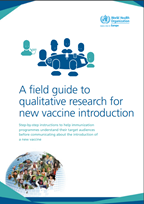News
All →Publications
This document provides evidence-based answers to frequently asked questions related to human papillomavirus (HPV), HPV vaccines, and prevention...
European Immunization Agenda 2030
The European Immunization Agenda 2030 (EIA2030) is a vision and strategy, designed and crafted by the Member States, for achieving the full...
European Immunization Agenda 2030: draft for the Seventy-first Regional Committee for Europe
This Draft document is prepared for the Seventy-first Regional Committee for Europe. The European Immunization Agenda 2030 (EIA2030), a vision and strategy...
Questions and answers about human papillomavirus (HPV)
Human papillomavirus (HPV) is a virus that infects the skin or various mucous membranes. There are over 200 types of HPV. Some HPV types, known...
A field guide to qualitative research for new vaccine introduction: step-by-step instructions to help...
Expanding a national routine immunization schedule to include a new vaccine is a positive step forward in reducing a country’s burden of disease....
New vaccine introduction: checklist for planning communication and advocacy: World Health Organization...
Vaccine-safety-related events, and how we respond to them, can affect public trust in vaccines and health authorities. These events may or may not...
Documents

Field guide to qualitative research for new vaccine introduction
Expanding a national routine immunization schedule to include a new vaccine is a positive step forward in reducing a country’s burden of disease....
Multimedia
All →Highlights
Related activities
All →
Strengthening community acceptance of vaccines through educational interventions
Overview
There is growing international recognition that vaccination programmes need a more comprehensive approach and coordinated action across sectors. Linking education and health is an essential part of this. This strategic priority for WHO is conceptualized in the European Immunization Agenda 2030, which highlights the importance of establishing cross-sectoral collaboration, developing education tools and integrating immunization into educational programmes and curricula. Learning about disease prevention and vaccines through educational activities can be just as crucial for children as other health topics. Schools and educational activities are the primary sources of knowledge for children and in a community. Evidence shows that the school setting offers a unique opportunity to reach important target groups with nuanced and comprehensible health information, creating an understanding of immunization at an early age and helping children build a foundation for making healthy choices for themselves and their families later in life. To support and address this, WHO/Europe has launched Immune Patrol, an innovative, digital, game-based education package on the immune system and vaccines.









